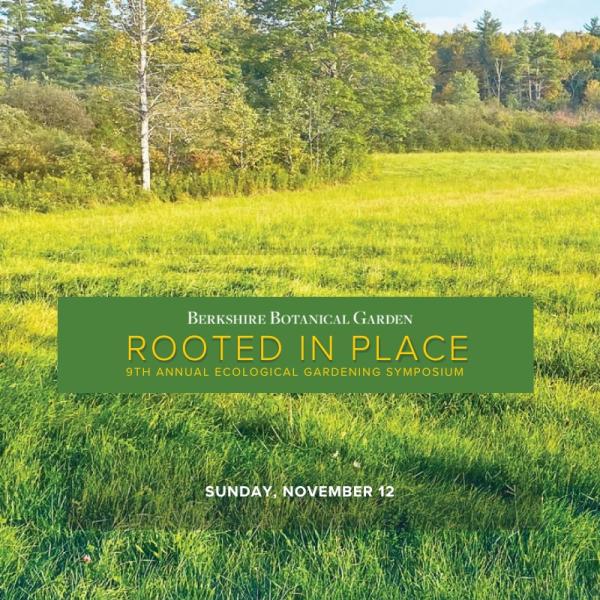Join experts in the field of ecological design to learn about their varied approaches to building resilient landscapes and communities. This day-long symposium on November 12 at the Berkshire Botanical Garden will explore the breadth of what regenerative design and land stewardship means, featuring a range of speakers with experiences as diverse as landscape design, community outreach, pollination systems restoration, and farming. Participants will have the opportunity to work hands-on with the day’s speakers to design their own projects.
Featured speakers include Evan Abramson, speaking on Beyond Pollinator-Friendly: Designing Landscapes and Corridors to Support Biodiversity and Climate Resilience — Farms, wildlands, sub/urban greenways, rural communities and large-scale solar developments provide immense opportunities for expanding regional biodiversity through the implementation of native pollination systems. What happens at the pollination scale has repercussions all the way through the food web to the largest predators and humans. Yet most efforts to restore pollinator habitat to date have increased the numbers of a few common species, rather than the range of wild pollinators needed for ecosystem resiliency. “Seeing lots of bees” does not necessarily mean that a landscape is pollinator-friendly.
Evan Abramson is a results-driven designer and planner on a mission to rebuild biologically diverse ecosystems through pollinator-plant interactions. As Founder and Principal of Landscape Interactions, he works closely with project partners along every step of the process, from conception through design, implementation and maintenance. Since 2019, Landscape Interactions has been responsible for over 300 acres of habitat installed in the Northeast, specifically targeting at-risk bee and lepidoptera species for each project location. He holds a Master of Science in Ecological Design from the Conway School of Landscape Design, Certificates in Permaculture Design and Biodynamic Gardening, and is the author of numerous publications, including Pollinate Now; Lincoln Pollinator Action Plan; Egremont Pollinator Pathway; and Great Barrington Pollinator Action Plan.
Also presenting is Jono Neiger on Regenerative agriculture and agroforestry: Food, soil health, and diversity on the farmscape — Commencing with an overview of regenerative agriculture and agroforestry practices and examples of farms and farmers using these approaches, participants will glean insight into the exciting potential and rising interest in combating habitat loss, soil degradation, and farm insecurity through this work. Jono Neiger and his work at Regenerative Design Group work to support local farms in their transition to more regenerative systems through planning and design, technical support, soil health practices, and water and soil management.
Jono Neiger leads the Regenerative Agriculture Wing at Regenerative Design Group (RDG). He has 30 years of professional experience in permaculture, site planning, agroforestry, conservation, and restoration. Jono teaches widely at colleges, workshops, and conferences. He has taught at The Conway School and was the founding Board President of the Permaculture Association of the Northeast. Before starting RDG, Jono worked as a land manager for Lost Valley Educational Center, a Conservation Officer for the Town of Palmer, MA and a Restoration Specialist with the Nature Conservancy. He holds a MALD from The Conway School and a BS in Forest Biology from S.U.N.Y. College of Environmental Science and Forestry. Jono is the author of The Permaculture Promise and the founder of Big River Chestnuts, a chestnut agroforestry farm in Sunderland, MA.
An afternoon panel will be moderated by Elizabeth Keen with Marie Chieppo, Owen Wormser, and Jim Schultz. $85 for BBG members, $100 for nonmembers. Register at https://www.berkshirebotanical.org/events/rooted-place

